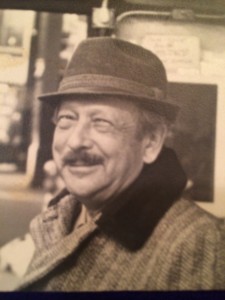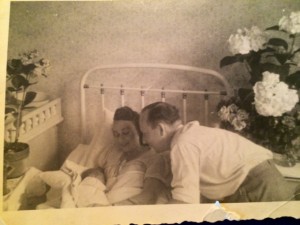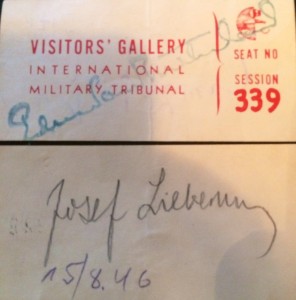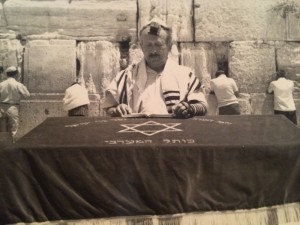Every year on Yom HaShoah I am haunted by my family’s history, reading countless testimonials about the Holocaust, yet I am silent about my own. I always believed that it was not my story to tell. But it is my story. I am the granddaughter of survivors. I am here because they survived. My mother was born in Germany in May 1946. Her father Joseph, was liberated from Buchenwald and her mother, Ella survived forced labor at the HASAG-Pelcery ammunition factory. This is their story.

Saba Joe (“grandpa,” in Hebrew) was the oldest of nine siblings. When his father died at age 48, he assumed his role as head of the family. He worked in the family’s leather factory and accepted the responsibility of providing a dowry for his younger sister. Czestochova, Poland was occupied on September 3, 1939. By June 1942 all Jews lived in the town’s ghetto with a swelling population of close to 50,000. They endured selections, forced labor and executions. During one of the selections, Joe gathered his young wife and two-year old son. Families were separated, children screamed and panic set in, as Jews who escaped to Czestochova from other towns had already reported about the mass deportations to Treblinka.
Joe’s wife was herded to one side, he to another. He never saw her again. His instinct was to save their son and he held him close to his chest and ran. The toddler went limp as a gun shot penetrated his small back. And just like that his young family was gone. As an able-bodied man, he was forced into labor at nearby HASAG iron works, which was converted into an ammunition factory to help support the war effort. He worked there with some of his brothers, while the others and his mother were sent to concentration camps. They lived in overcrowded barracks, suffered starvation, inhumane treatment and typhus. In January 1945, five months before the war ended, HASAG was evacuated and Joe was sent to Buchenwald. He was imprisoned there during the months that Elie Wiesel was also a prisoner in this hell-on-earth. Miraculously they both survived.
After the war, emaciated at 100 lbs, he made his way back to his hometown in an attempt to find any surviving family members. I have often wondered how he managed to survive the Camp knowing that his wife and child had already died. How did he find the will to push forward and hang on to life? Of his nine brothers and sisters, four survived. Perhaps a better than average statistic. His inner scars were unhealed and raw until the day he died in Florida at the age of 82. His outer scars manifested in the form of an intermittent but ever-present tremor of his head. People assumed he had Parkinson’s, when in fact he had permanent nerve damage from a severe beating he received in the Camp for refusing to become a Capo, despite the better treatment this status would have afforded. He would not turn his back on his fellow man and somehow managed to see the good in people throughout his life.

Savta Ella (grandma) was also imprisoned at HASAG and to this day we do not know what happened to her after HASAG was evacuated. Where did she go? How did she survive? She never spoke about the war and changed the subject when it was broached. We do know that she was married prior to the war, that her husband did not survive and that she had an abortion to protect her unborn baby from the horrors of life in those days. The only real glimpse we have into her existence is a small fine-toothed comb that she gave my mother. She hid the comb and used it to rid her thinning hair of the lice epidemic that was rampant in the barracks. She was a beautiful woman with piercing blue eyes and we often speculate about what she may have experienced in order to survive. But this guesswork sends our minds to unimaginable places. Ella’s parents were sent to concentration camps and did not survive. She had three brothers. Sam left for the U.S. on the last boat leaving Europe in 1939, Ignatio left for Argentina before the war, and Bolek survived with her, but died shortly after liberation. His cadaverous anatomy could not support the rich foods supplied by aid workers.

As was common in the days after the war, Ella and Joe who knew each other before, found themselves living in a home with many other survivors from their town. Joe had played soccer with her brothers during better times. Even in the aftermath of the worst crime against humanity, these broken spirits found love. They were married three months after the war ended, and my mother was born in May 1946. Joe attended the Nuremberg Trials three months after her birth.
The young family could not emigrate to Palestine because Ella was severely jaundiced. Entrance to Palestine was restricted by the British who ruled it at the time making transports illegal. Instead, they emigrated to New York to join Joe’s surviving siblings, Sam, David, Marty and Max, and Ella’s brother Sam. Joe and Sam owned a business, which imported the parts that made sounds in children’s toys. Had they made the transport to Palestine and gained entry, would I have been born to two Israeli parents? Would it be the same two parents? I was born in Israel in 1969 to my Israeli father and American mother, who eventually made her way there, manifesting the dreams of her surviving parents.
Joe, who never lost faith in humanity, lost his faith in God. He did not find it again until my mother was old enough to ask questions like “are we Jewish?” and “what does that mean?” Along with finding his way back to faith, the philosophy of “forget and move forward” gave way to “we must never forget….”

Saba Joe taught us that anything was possible. He never took no for answer, a trait I may have inherited. He taught us not to judge others until we walked in their shoes, and even then…When we complained about our problems he told us that if all the people in the world sat in a circle and put their bundle of issues in the center, in the end, we would each take back our bundle and move on — because it belongs to us and we are used to dealing with it. It is this spirit of resilience and inner strength that I honor today, and that has helped me find my voice to share this story.

Thank you for sharing your family’s story. I too am a May, 1946 baby. But for life circumstance, your family’s story and the story of 6 million Jewsish family’s, could have been my family’s story. Yet, it is my story as I am a Jewish woman in every fiber of my being. I am a member of this family of people, Jewish people and proud of it. I will never forget. Bless you and yours.
Such a beautiful story of hope and courage in the midst of the horrors of a Nazi concentration camp. Thank you for sharing your story and the story of your grandparents.
Thank you all for the incredible support. Sharing was not easy but I do not regret it. In fact, I have started digging deeper into my family’s history and hope to uncover the answers to so many questions we still have. A friend sent me an email and I wanted to share her perspective because I do not objectively hear my own tone in my writing. It is not an intentional process: “Your writing is beautiful in its simplicity and unfolding, It was kind without incrimination. Mostly, it was forgiving rather than bitter. The human spirit, as you depicted, is wondrous. Thank you, Erris, I am lucky to know you through our writer’s group.”
Your grandparents live on, not just in your memory and heart, but now in ours as well.
A touching story, one of so many lost in time. This time however that fading memory buried deep in the mind of an old man was given life again through your words.
Through your beautiful writing you bring forward an unimaginable story with compassion, grace and profound imagery. Please keep sharing your family’s story. We need to hear it, be reminded, be grateful and amazed, and carry it on. Thank you!
Sometimes I wonder if the untold story (Ella) is more haunting than the told story. I am certain that their strength and beauty lives on in my mom, siblings, even our kids. It’s chilling to remember, but we will never forget.
Your grandfather’s legacy of love and forgiveness is truly inspiring…what an exceptional man!
After all these years the story of your Mom’s parents– I have never heard. It is heartbreaking but also amazing showing such endurance and strength of character! It is no wonder that their daughter turned out to be the wonderful person she is today!!
As horrible a story this is, it shows the resilience, faith and love that can endure the worst of times. Your life today is a testament to your ancestry. You should be proud of who you are and from where you came-and I know you are! We are all stronger than we think. Thank you for sharing this very personal touching story.
We will never forget…
Heartbreaking. Your grandfather endured a lot and he’s was right, our problems are often no where near as insurmountable as others.